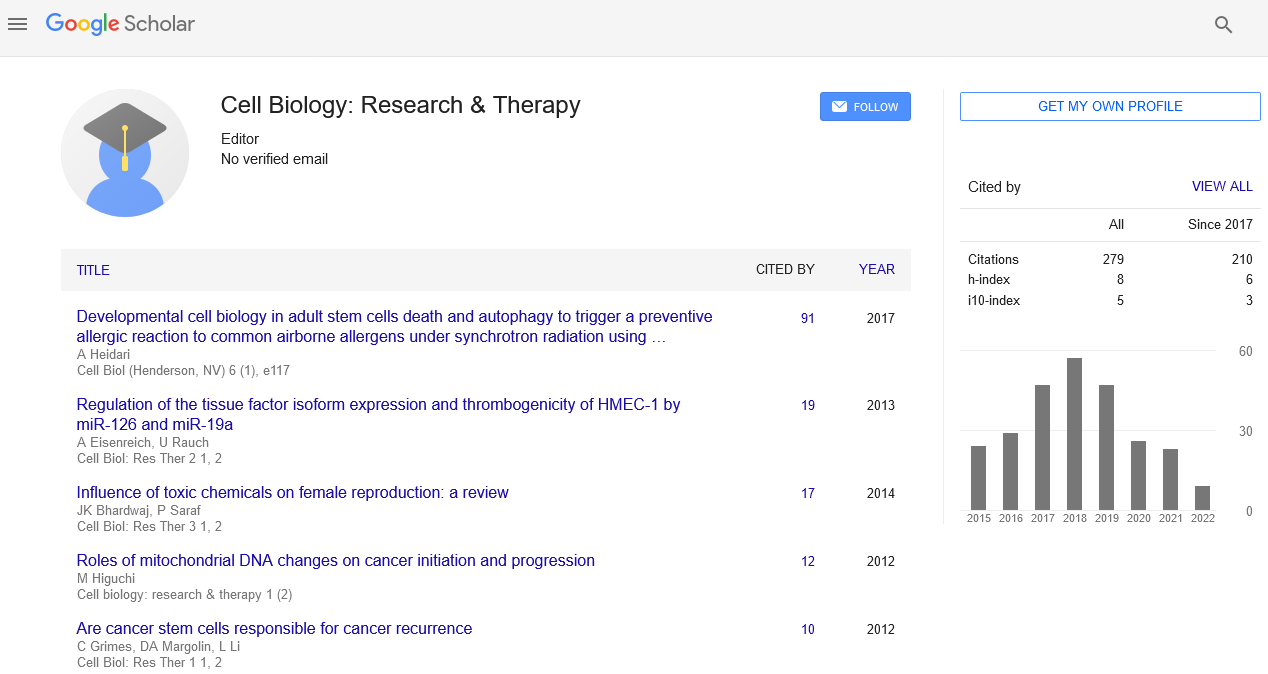Commentary, Cell Biol Vol: 12 Issue: 3
Cellular Signaling Pathways in Inflammatory Disorders: Therapeutic Opportunities and Challenges
Guoz Cheng*
1Department of Clinical Immunology, Central South University, Changsha, China
*Corresponding Author: Guoz Cheng,
Department of Clinical Immunology,
Central South University, Changsha, China
E-mail: gouzchen@csu.cn
Received date: 02 September, 2023, Manuscript No. AT-23-116142;
Editor assigned date: 04 September, 2023, PreQC No AT-23-116142 (PQ);
Reviewed date: 18 September, 2023, QC No AT-23-116142;
Revised date: 25 September, 2023, Manuscript No AT-23-116142 (R);
Published date: 05 October, 2023, DOI: 10.4172/2324-9293.1000189.
Citation: Cheng G (2023) Cellular Signaling Pathways in Inflammatory Disorders: Therapeutic Opportunities and Challenges. Cell Biol 12:3.
Abstract
Description
Inflammatory disorders represent a diverse group of diseases characterized by dysregulated cellular signaling pathways. Understanding the intricate network of molecular signals that underlie these conditions is major for developing effective therapeutic strategies. The therapeutic opportunities that arise from targeting these pathways while addressing the challenges associated with such interventions. A comprehensive understanding of cellular signaling in inflammation holds immense potential for the development of novel treatments and personalized medicine approaches.
Inflammatory disorders encompass a wide range of conditions, including autoimmune diseases, chronic inflammatory conditions, and allergic reactions. These disorders are characterized by an abnormal immune response and dysregulated cellular signaling pathways. Deciphering the molecular intricacies of these pathways is essential for the development of targeted therapies that can mitigate the debilitating effects of inflammation.
Key cellular signaling pathways
NF-κB signaling: The NF-κB pathway is a central regulator of inflammation. It controls the expression of numerous pro-inflammatory genes, making it a prime target for therapeutic intervention. Inhibitors of NF-κB activation are being explored for their potential to dampen excessive inflammation.
JAK-STAT signaling: The Janus Kinase/Signal Transducer (JAKSTAT) pathway is major for the transmission of signals from cytokines and growth factors. Dysregulation of this pathway contributes to the pathogenesis of autoimmune diseases. Small molecule inhibitors of JAK kinases have shown results in treating conditions like rheumatoid arthritis.
MAPK signaling: The Mitogen-Activated Protein Kinases (MAPK) pathway is involved in the regulation of cellular responses to stress and inflammation. Targeting specific MAPK components can help modulate inflammation and may offer therapeutic benefits in diseases such as Crohn's disease and psoriasis.
PI3K-AKT-mTOR signaling: Dysregulation of this pathway has been linked to inflammatory conditions, including autoimmune diseases and cancer. Inhibitors targeting various components of this pathway are under investigation for their anti-inflammatory effects.
Therapeutic opportunities
Biologics: Monoclonal antibodies targeting specific cytokines or receptors have revolutionized the treatment of inflammatory disorders. Examples include TNF-α inhibitors for rheumatoid arthritis and IL-4/ IL-13 inhibitors for atopic dermatitis.
Small molecule inhibitors: Small molecule drugs that target key enzymes in inflammatory signaling pathways are in development. These drugs offer the advantage of oral administration and can target intracellular signaling pathways effectively.
Gene therapy: Gene editing technologies holds for modifying the expression of genes involved in inflammation. CRISPR-Cas9 and related techniques offer potential for personalized treatment approaches.
Challenges
Specificity and safety: Targeting specific signaling pathways presents challenges in terms of off-target effects and potential harm to essential physiological processes. Achieving the right balance between efficacy and safety is a paramount concern.
Resistance: Long-term use of certain therapies can lead to drug resistance or loss of efficacy, necessitating the development of alternative treatment strategies.
Personalized medicine: Tailoring treatments to individual patients based on their unique molecular profiles and disease characteristics remains a challenge but offers significant potential for improving therapeutic outcomes.
Conclusion
Cellular signaling pathways play a pivotal role in the pathogenesis of inflammatory disorders. Understanding these intricate networks offers numerous opportunities for therapeutic intervention. Biologics, small molecule inhibitors, and emerging gene-editing technologies are at the forefront of the battle against inflammatory diseases. However, challenges related to specificity, resistance, and personalized medicine must be addressed to harness the full potential of targeting cellular signaling pathways.
 Spanish
Spanish  Chinese
Chinese  Russian
Russian  German
German  French
French  Japanese
Japanese  Portuguese
Portuguese  Hindi
Hindi 